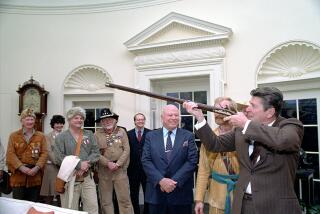U.S. Had Its Own ‘Perestroika’
- Share via
In a timely, informative article (“Conservative Rejoins Attack on Radical Soviet Reformers,” Aug. 6, Part I), Michael Parks vividly portrays the mounting attacks by Soviet conservatives on President Mikhail S. Gorbachev’s political, economic and social reforms--the fundamental restructuring policies more popularly known as perestroika. Leveling her angry charges against “left-wing intellectual socialists,” arch-conservative Nina A. Andreyeva (who also defends dictator Josef Stalin’s contributions to the Soviet Union) recently wrote that “Their justification for an assault on socialism has been an excessive exaggeration of economic difficulties . . .”
Reading her words reminded me of similar hot rhetoric directed against President Franklin D. Roosevelt when he was trying to save capitalism through political, economic and social reforms that strike me in retrospect as perestroika, American-style. The year was 1932. To my boss, Roosevelt was, in the words of Andreyeva, a “left-wing intellectual socialist” and like the Soviet lady, my boss mocked “reform economists for launching the country on a course that had not been fully thought out.” Like the Soviet lady, the guy was not a conservative but a reactionary who dreaded change above all else.
But change is what our country desperately needed then. And change is what the Soviet Union must have now--or else.
There are other similarities. Both perestroikas were made mandatory by economic systems that no longer served the needs of their people. When I was in the Soviet Union recently, it was evident beyond any doubt that the country was an economic basket case. In Moscow and Leningrad there are long lines waiting to buy whatever may be available. In the United States at the time Roosevelt took office, the long lines were bread-lines or soup-lines.
Capitalism needed a shot of humanism in order to survive. Roosevelt realized that, and was a better patriot than the Americans who reviled him. At first all he could offer were words of encouragement, but gradually his innovative policies began to replace words with deeds. That is what Gorbachev is trying so hard to do now. Because a stable, “prosperous” Soviet Union is in our own enlightened self-interest, we should all be doing what we can to help make that happen.
HAROLD WILLENS
Los Angeles

